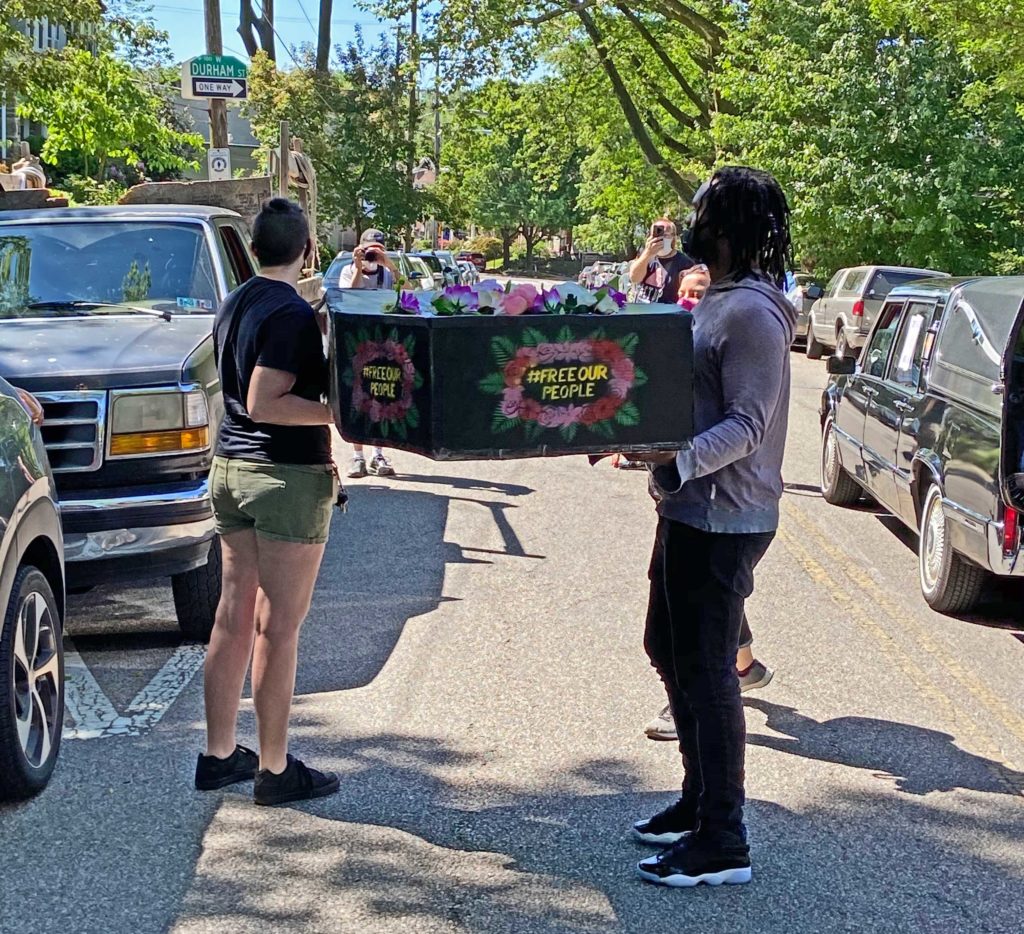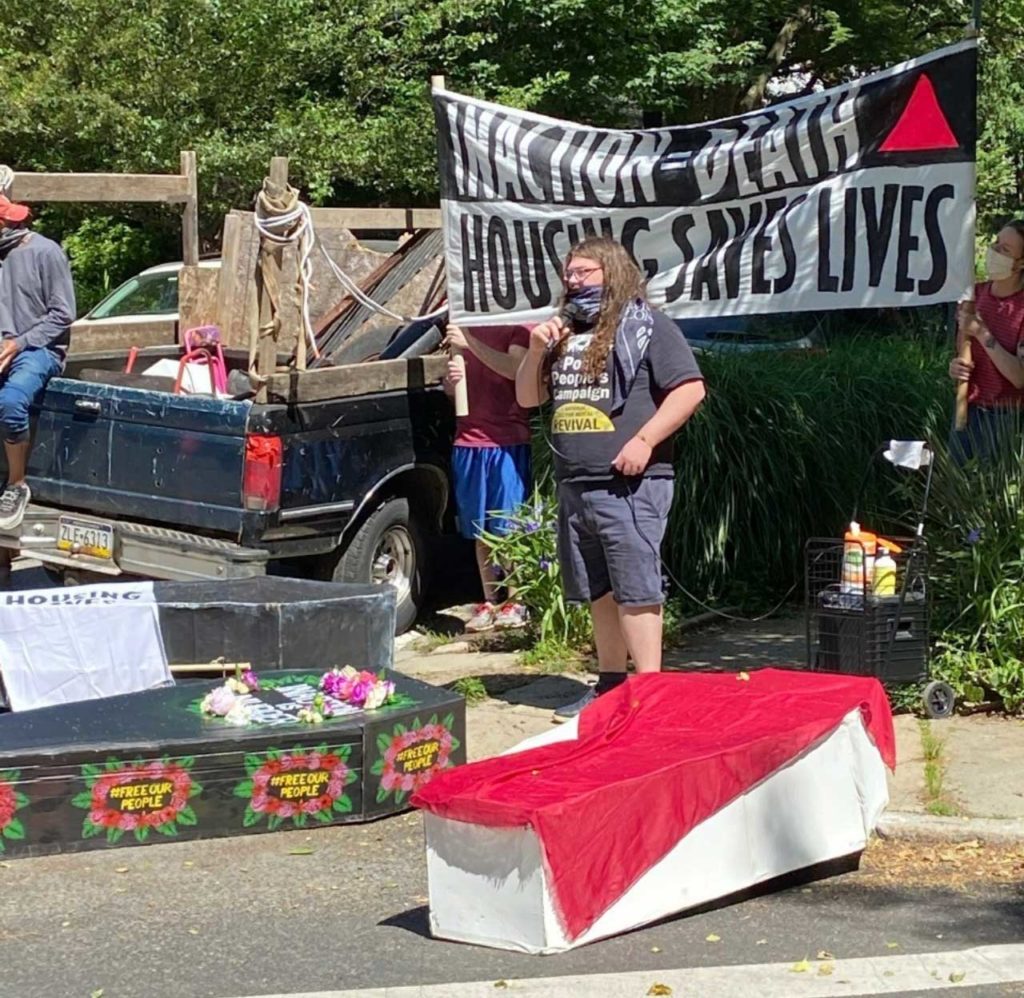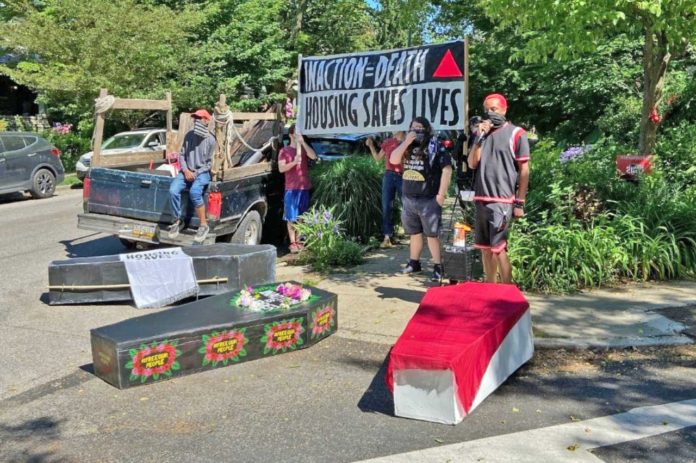On the heels of the first protests against the police killing of George Floyd, members of Philadelphia social justice organizations came together to hold a political funeral mourning the COVID-19-related deaths of people facing homelessness and living in congregant housing.
On Sunday, May 31, members of ACT UP Philadelphia, Disabled in Action/ADAPT Philly, the Coalition Against Death by Incarceration, the Philadelphia Healthcare Rights Committee of Put People First! PA and ally organizations gathered outside the Mt. Airy home of Liz Hersh, director of Philadelphia’s Office of Homeless Services. It was the collective organizations’ second such political protest in May.

Fifteen cars carried roughly two dozen activists in a hearse-led procession down Hersh’s street. A Banner that read “Inaction = Death” and “Housing Saves Lives” was erected on the corner, and three coffins were displayed on the street bearing similar slogans. Several organizers spoke, including ACT UP member and community activist Jamaal Henderson, ACT UP organizer José de Marco, Poor People’s Campaign member Jacob Butterly, who led the crowd in song, and ADAPT Philly member Latoya Maddox, among others.
“[Liz] is one of those people who make decisions and push for policies that would make sure that epidemics like this don’t claim needless lives,” Henderson said as they spoke during the funeral service. “Instead, they do nothing. Their inaction has caused what we know of to date, seven deaths between homeless shelters and nursing homes that we feel need to be addressed.”
In a written statement, Philadelphia Deputy Communications Director Mike Dunn said, “One person has died of COVID in the shelter system out of more than 5,700 who have stayed there since the pandemic began. We previously acknowledged that death.”

In previous meetings with Hersh, Philadelphia Managing Director Brian Abernathy and Deputy Managing Director of Health and Human Services Eva Gladstein, members of the aforementioned organizations expressed their concerns about what city officials should do to keep people living in congregant housing as safe as possible during the pandemic. Some of those provisions include establishing a policy to promptly transfer COVID-positive people to hospitals instead of having them wait in shelters during nights and weekends, and that homeless individuals traveling from airport encampments to shelters be tested for the virus.
In response to the collective organizations’ demands and political funerals, Dunn said in his statement, “City leaders are fully engaged with the group ACT UP and have heard their concerns first-hand. In fact, Liz Hersh, Managing Director Brian Abernathy and Deputy Managing Director Eva Gladstein have met twice with ACT UP in recent weeks and have another meeting scheduled soon. It is also important to note that the City, since the start of the pandemic, has worked vigorously to ensure that the shelters are safe, instituting strict social distancing guidelines and other precautions almost immediately.”
“[Hersh, Abernathy and Gladstein] told us that they [wouldn’t] be clearing out the encampment at the airport until they could offer universal testing to everybody, and the people who did test COVID-positive or at risk for COVID would be eligible for the hotel stays,” Henderson told PGN. But, Henderson said, that didn’t happen. Instead, people in the encampments were told they had to clear out, that they could get tested if they wanted to and were ultimately taken to shelters.
ADAPT’s Maddox addressed the funeral crowd via Zoom. “I’ve had conversations with individuals who do not want to go into the shelter system because of COVID-19 and because of how they’ll be treated,” Maddox said. “I’ve heard from people that they’re being told by shelter staff that even though the hotels have accessible rooms that they can’t use them unless they have someone to assist them.”
In reference to the city’s use of hotel spaces as quarantine sites, Dunn said, “The City has already served more than 250 people in the quarantine site so far. All of them have improved. We established the separate COVID Prevention Space for the highest risk people, those over 65 or with a chronic medical condition. It has already [housed] about 50 people and we are continuing to move people from shelters and the street into the site.”
In their opening remarks to the funeral-goers, Henderson said, “We saw widespread chaos in downtown Philadelphia [Saturday.] This is because, as usual, this city shows us that Black and Brown lives, poor, disabled, homeless lives mean nothing to them.”
A disproportionately high number of Black and Brown people, subsets of the LGBTQ community and intersections thereof experience homelessness, housing instability and incarceration.
According to a 2020 report by the Williams Institute, LGBTQ youth in the U.S. comprise 20-45% of the entire homeless youth population, and LGBTQ people’s risk of experiencing homelessness exceeds that of their cishet peers by more than two times. A recent report by the National Center for Transgender Equality shows that LGB people are three times as likely to be incarcerated than the overall population.
The 2019 Annual Homeless Assessment Report, created by The Department of Housing and Urban Development, indicates that although African Americans make up 13% of the U.S. population, they make up 40% of people who experience homelessness. The report also shows that Hispanic or Latinx people account for 22% of the homeless population, but compose 18% of the general population.
A report by the Pew Research Center shows that in 2017, Black people made up 12% of the U.S. adult population, but comprised 33% of the “sentenced prison population.”
During remarks to his fellow funeral attendees, ACT UP’s de Marco said, “I’d like to start by remembering Ahmaud Arbery, Breonna Taylor and George Floyd this morning. I’d like to just think about that for a second or two because we should be saying their names and remembering.”
De Marco also criticized the city’s plan to increase Philadelphia Police Department funding by $14 million, while cutting funding for other vital services, including housing.
“We all know what happens when people are homeless and left to fend for themselves in the street,” he continued.
Members of the organizations reconvened after the funeral to debrief and share their thoughts, including Vanette Jordan-Lumogo, who works as a case manager for a social service agency and volunteers with Global Women’s Strike.
“We’re the people who put Band-Aids on families because we really can’t offer much in terms of long-term assistance,” she said. “We don’t really deal with the systemic poverty and racism, systemic [houselessness] that happen in this city because we would need to fight for real change to seriously help. I feel like I battle with [the Department of Human Services] all the time trying to reach out for more from them, trying to get front line workers there to come forth and testify to legislators and do the right thing on the systemic level.”
